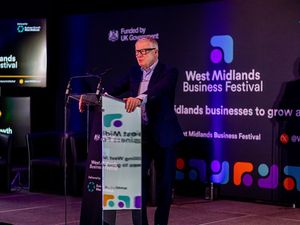Severn Trent creating 1,000 new jobs for Midlands and boosting help on bills
Water company Severn Trent has announced plans to create 1,000 new jobs and says it will increase its existing financial support for up to 50,000 of customers who need it most.
The Coventry-based FTSE 100 company, which serves eight million people across the Midlands and mid-Wales, has confirmed that in the next two years it will be creating the roles, including its biggest ever intake of 130 apprentices this year.
It will support 315,000 people a year with paying their water bill and up to 50,000 of those customers will now also receive additional financial debt support from the new Big Difference Plus scheme. Some customers will receive a reduction of up to 90 per cent
An investment programme worth more than £2.5 billion on network improvements and projects spanning the entire Midlands will also be delivered over the two years.
Severn Trent says it is committed to creating long-term jobs, investing at a huge scale in the region and financially supporting more customers than ever before.
As part of its new jobs for the region, Severn Trent is also set to take on 65 graduate placements and 60 summer internships.
The 1,000 new jobs for the Midlands builds on the company’s 10-year programme to help 100,000 people out of water poverty by 2032, giving people the skills and support to help find work. The programme will have also provided up to 4,800 work experience placements aimed at providing opportunities for schoolchildren living in some of the most deprived areas across its region.
The Severn Trent bill remains the second lowest in the country, with people receiving water and wastewater service for just over £1 a day on average.

Chief executive Liv Garfield said: “Creating job opportunities, continuing significant regional investment, and financially supporting more customers than ever before is made possible by the strong results we have delivered this year.
“At a time when unemployment rates in our region are increasing and the cost of living crisis is still front and centre of many customers’ minds, we are proud to be able to create 1,000 jobs in our region over the next couple of years and to further help up to 50,000 customers with financial support. This, coupled with our long-term programme to help people into work, go towards truly supporting the communities we serve.
“This support is being delivered whilst continuing with the multi-billion pound investment in the region to improve water and waste services, providing an exceptional service and investing in our people who go above and beyond every day to make a positive impact in our region. We are expecting the biggest investment period the sector has ever seen, with a focus on water resources, improving environmental standards and on Net Zero, and we feel more than ready for this exciting opportunity ahead of us.”
The investment programme involves a series of projects spanning the Midlands and will also be creating thousands of jobs through its supply chain.
Severn Trent is investing millions of pounds to improve river health, secure water supplies and replace over 200 miles of new pipes to improve services for customers.
As part of its annual 2022-2023 results announcement, Severn Trent also said that as a result of millions of pounds spent moving water around the network and the outstanding response from customers in being mindful about their water usage through last year’s hot and dry summer, the Severn Trent region has avoided having a hosepipe ban for nearly 30 years.
The company says it is firmly on track to reduce leakage by 50 per cent by 2045.
It has also made progress a year on from announcing its commitment to protect and improve the health of the region’s rivers.
Results show the impact from its operations has reduced by one third in one year.
Severn Trent claims it is moving faster, in some cases 20 years ahead of targets set out by regulators. and the Get River Positive pledges have made a difference across its region over the last 12 months, including investing £100 million a year on improving infrastructure.




